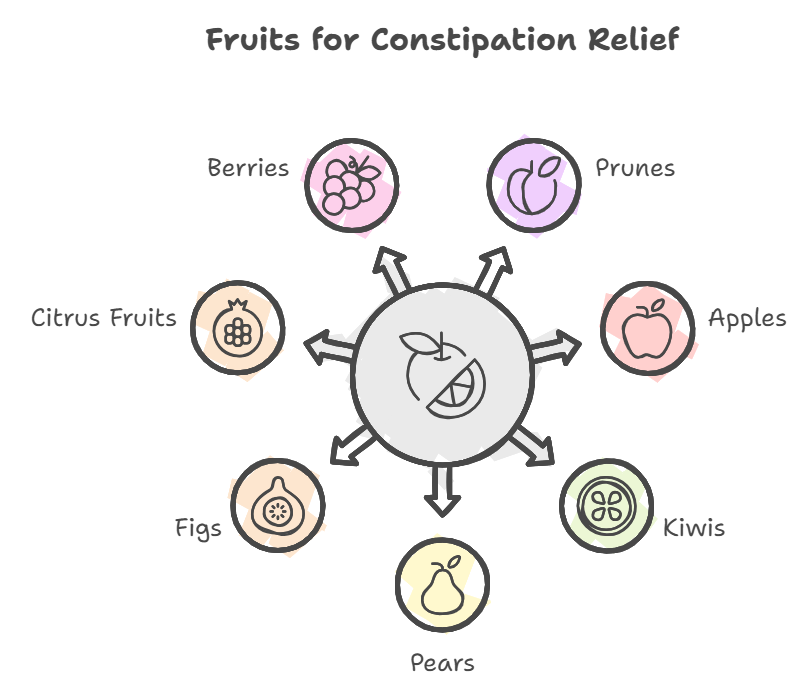Dealing with constipation can be uncomfortable. Thankfully, adding certain fruits to your diet can offer relief.
This exploration of fruit to ease constipation will cover high-fiber options. It will discuss their benefits and give tips for adding them to your daily fiber intake.
Sluggish bowels are frustrating. Before using harsh laxatives, try fruit to ease constipation. It’s a tasty, high-fiber, vitamin-rich, and naturally sweet solution.
“Fruits and vegetables should make up the bulk of our diet, as they are the best sources of the fiber our bodies need.”
Dr. Michael Greger
The Power of Fiber: Why Fruit Helps with Constipation
Fiber is essential for digestive health. It softens stools and promotes regular bowel movements. This helps ease constipation.
There are two main types: soluble and insoluble fiber. Both are important for relieving constipation and are abundant in fruit.
Soluble fiber, found in apples, bananas, and pears, absorbs water in your gut. This forms a gel that softens stool. It eases chronic constipation and promotes good relief from it.
Insoluble fiber, present in fruits like berries and kiwis, adds bulk to stool. It helps it move smoothly through your system. This improves bowel transit time and prevents lumpy stools.
The mix of soluble and insoluble fiber in fruit makes it a top choice for constipation relief.
Superstar Fruit to Ease Constipation
Here are some specific fruit examples for incorporating fruit to ease constipation:

- Prunes: Known for their laxative properties, prunes are high in both soluble and insoluble fiber, which helps soften stools and stimulate bowel movements. A quarter-cup of prunes contains about 3 grams of fiber and sorbitol, a natural sugar alcohol that further softens stool.
- Apples: A medium apple with its skin contains almost 5 grams of fiber, including pectin, a soluble fiber that forms a gel-like substance, softening stools and easing their passage.
- Kiwis: This fuzzy fruit to ease constipation is full of fiber (around 2-3 grams per kiwi) and vitamin C, speeding up gut transit time. Aiding those suffering from difficulty passing stool.
- Pears: One medium pear contains over 5 grams of fiber, along with sorbitol and fructose, which act as mild, natural laxatives. They are a great source of fiber to help soften stool and encourage regular bowel movements.
- Figs: With about 7 grams of fiber in just a half-cup of dried figs, this fruit to ease constipation symptoms helps to relieve bloating and discomfort, making passing stool easier.
- Citrus Fruits: Oranges and grapefruits offer decent fiber content and a mild laxative effect. Compounds like naringenin and pectin promote digestive health and help regulate bowel movements.
- Berries: Raspberries, strawberries, blueberries, and blackberries are packed with fiber. Raspberries boast 8 grams of fiber per cup, aiding in the battle against irregular bowel movements and difficulty passing stool.
Beyond Fruit: Other Tips to Stay Regular
While fruit to ease constipation is important, other lifestyle factors play a significant role.
Hydration is Key
Hydration plays a vital role in digestive health, particularly when it comes to preventing constipation. Dehydration can lead to hard, difficult-to-pass stools, making regular hydration essential. Aim for about eight glasses of water daily, as this helps to soften stools and promote smoother bowel movements1.
Increasing your water intake is particularly important when adding fiber to your diet, as fiber absorbs water to form softer stool and prevent constipation. Alongside water, consider incorporating hydrating foods and drinks like fruit juices, herbal teas, and clear broths into your routine2.
It’s also wise to limit excessive consumption of caffeine and alcohol, as these substances can contribute to dehydration.
Probiotics for Digestive Health
Adding probiotics to your diet can support digestion and alleviate discomfort. Yogurt, rich in live bacteria, is a great starting option, as it’s both versatile and widely available.
Fermented foods like kimchi and miso add good bacteria to your system. They promote a balanced gut microbiome. For a refreshing twist, kombucha—a fermented tea—provides probiotics along with a bit of fizz3.
Prebiotic foods like bananas, onions, and garlic help probiotics. They “feed” them to thrive in your gut. Prebiotics and probiotics, together, can improve digestion. They may ease bloating, gas, and constipation4.
If symptoms persist or worsen after a few weeks, see a healthcare provider. They can suggest supplements or dietary changes to support your digestive health.
If you’ve been trying these dietary adjustments but still find yourself struggling with digestive issues, it might be worth exploring some additional solutions.
I recently stumbled upon a product that claims to support digestive health effectively. It’s called Get Thin USA, and many users have shared positive experiences about how it helped with their gut health and weight management. If you’re interested, you can check GetThin USA out here.
Of course, if symptoms persist or worsen after a few weeks, it’s always a good idea to consult a healthcare provider. They can suggest supplements or dietary changes tailored to your individual needs.
Moving for a Regular Digestive System
Adding regular movement to your routine can greatly improve digestive health. Exercise helps food move through your digestive tract. This prevents issues like bloating and constipation.
Even light activity, like a 10- to 15-minute post-meal walk, can stimulate bowel movements. It does this by activating your intestinal muscles.
Practices, like stretching, tai chi, and some yoga poses—especially twists and forward folds—are great for digestion.
If you’re feeling uneasy due to digestive issues, consider trying some gentle movements that feel good. For more tips on integrating movement into your routine to boost health, check out this article on Walking or Running to Boost Your Health.
Remember, consistency in physical activity is key for lasting digestive benefits. Aim for 30 minutes of moderate activity each day. Brisk walking, cycling, or light jogging can help. It will support a regular digestive rhythm.
Establishing a Bathroom Routine
Establishing a consistent bathroom routine can significantly aid in promoting regular bowel movements. Try to schedule a daily bathroom visit at the same time each day, preferably after meals when your digestive system is most active.
This consistency can train your body to expect and facilitate a bowel movement.
While sitting on the toilet, elevating your feet on a stool can help align your body for easier passage of stool. This position can relax the muscles involved in bowel movements, making the process smoother.
It’s also beneficial to take this time to focus on relaxing, rather than distracting yourself with mobile devices, which can lead to prolonged sitting and may interfere with the natural urge to go.
If you find that dietary changes or lifestyle adjustments aren’t providing enough relief, consider discussing over-the-counter options with your healthcare provider5.
They can guide you on suitable remedies, ensuring they align with your individual health needs. It’s also important to communicate openly with your doctor about what you consider to be good constipation management, as they can provide tailored advice and support.
Incorporating More Fruit to Ease Constipation into Your Diet
| Meal | Fruit Ideas to Ease Constipation |
|---|---|
| Breakfast | Berries in yogurt, sliced bananas on toast, or a smoothie with kiwi and spinach. |
| Lunch | Apple slices with peanut butter, a pear and cheese salad, or a fruit salad with grapes and oranges. A fiber-rich sack lunch can simplify things. |
| Dinner | Baked apples with cinnamon, grilled pineapple with chicken, or roasted sweet potato with other vegetables. Sweet potato can be helpful because it is considered high fiber, which helps soften stools. |
| Snacks | Dried figs, prunes, or a handful of grapes. |
Frequently Asked Questions
What is the best fruit to ease constipation?
There isn’t one single “best” fruit. Prunes, kiwis, figs, pears, and apples are known to help with good constipation relief. Because reactions vary, experimenting is key.
People react differently to fruit to ease constipation. So, find what works best for you. It is important for easing constipation and improving bowel movements.
Watch how your body reacts to high-fiber fruits. Adjust your diet based on that. To fix lumpy stools or blood sugar issues from constipation, you usually need to change your diet and drink more fluids.
What simple trick empties your bowels immediately?
No method provides instant relief. For quicker results, combine warm water, belly massages, increased fiber, and exercise.
In extreme cases, over-the-counter solutions may help, but consult a health provider first. Before using drastic solutions, consider women’s health and any underlying conditions.
Persistent constipation can link to intermittent fasting or multiple sclerosis. So, seek medical advice.
Good constipation management requires patience and lifestyle changes. You must also understand your digestive tract.
Focusing on blood pressure and eating nutrient-rich foods can help. Include leafy greens and nuts. They can maintain regular bowel movements and relieve chronic constipation.
Some plant-based foods contain short-chain fatty acids. They support gut health and healthy bowel function.
These foods can help with constipation as part of a holistic approach.
What is the king of fruit to ease constipation?
Prunes are often considered helpful due to their sorbitol content, aiding stool softening. However, various other fiber-rich fruits can ease constipation.
Dietary diversity and increased fluids are crucial. People react differently to fruits. What helps one may not help another.
It’s important to experiment with fruit to ease constipation. Find what works for your diet and health, whether for women’s health or other issues.
How can I soften my stool quickly?
Chia seeds are a good option for stool softening due to their high fiber content. They absorb moisture in the gut. This forms a gel-like substance and improves bowel transit time.
This can improve good constipation and prevent issues such as difficulty passing stool. Another suggestion is to eat more fiber. Foods like leafy greens and nuts can help your bowel movements.
Ulcerative colitis can worsen constipation. So, focus on good relief for it. It will help you run smoothly.
Conclusion
Incorporating fruit to ease constipation is a tasty and effective digestive health strategy. High-fiber fruits, with hydration and exercise, promote regular bowel movements. An insoluble fiber-rich diet helps too.
Adding high-fiber fruit to ease constipation, combined with beneficial habits, leads to a healthier gut. Increase fiber slowly. Drink plenty of water. If constipation lasts over 3 weeks, consult a doctor.
A review of controlled trials in Clin Nutr and Gastroenterol Hepatol would help. It would focus on the effects of different fibers on women’s health conditions.
High fiber is often good. But, it can worsen some conditions, like ulcerative colitis.
A balanced fiber diet is key to managing constipation. It helps prevent discomfort, especially if you have trouble passing stool.
To promote better digestion, consider starting your day with a fruit smoothie that includes a variety of high-fiber fruits. Experiment with different combinations to find what works best for you!
Small Step, Big Impact
Incorporating a variety of high-fiber fruit to ease constipation like prunes, apples, and kiwis into your daily diet can naturally alleviate constipation. Aim to include at least two servings of these fruits each day, and remember to stay hydrated to support optimal digestive health.
Listen to this article
This is an AI generated Podcast version of the article.
- https://www.tuasaude.com/en/natural-laxatives/[↩]
- https://www.eatingwell.com/article/7940041/best-fruit-for-constipation-according-to-a-dietitian/[↩]
- https://www.newscientist.com/article/mg26435150-800-are-fermented-foods-like-kimchi-really-that-good-for-your-gut/[↩]
- https://pmc.ncbi.nlm.nih.gov/articles/PMC5622781/[↩]
- https://www.foodsforbetterhealth.com/fruits-for-constipation-31944[↩]



